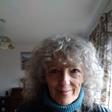‘I tried to fight that unwelcome ‘call’ [to singleness] when I was older, but it has given me the ability to be available to listen to other singles and really hear them,’ says Sheila Jacobs, who ended up writing a novel with singles as the main characters.

I’d been writing non-fiction (and editing books, my ‘day job’) and hadn’t written a novel for years, when my friend challenged me to write a story for her, for Christmas, and she would paint a picture for me. We exchanged gifts and I thought: This might be the start of a novel. I’d already thought about writing a novel set in an idyllic village, after I’d been to a steam fair in rural East Anglia with another friend.
Trusting God’s sovereignty in singleness
What interested me most was writing a story from four different points of view, over a year. So we have Meg, haunted by the past and needing to forgive herself, encountering the enigmatic, attractive Barny, who is unable to commit to anyone or anything. The second part is written from his viewpoint, so we understand something of his background and why he acts the way he does. The third section is Rosemary’s story. An older lady, married to the ever-patient Arthur – who isn’t a Christian – she’s been fervently religious, but is now seriously doubting her faith. Lastly, there’s Jason, the 30-something vicar, struggling to maintain the façade of perfection.
This is a novel about the nature of forgiveness, love, doubt and honesty. But most of all, I wanted it to be about perspectives.
It was only when I finished the book that I realised all the main characters except Rosemary are single; most of the supporting characters are, too!
It was only when I finished the book that I realised all the main characters except Rosemary are single; most of the supporting characters are, too! I was stunned. Is my whole world populated wholly by singles? No. So, why was my latest novel full of them?
Twenty years after being widowed - I still felt married, until I heard a sermon on singleness
I’m a lifelong single. I have male friends, but haven’t been involved in a romantic relationship for around half my lifetime. Why? Circumstances… And the fact that I felt God ask me to be single when I was in my twenties. I tried to fight that unwelcome ‘call’ when I was older, but it has given me the ability to be available to listen to other singles and really hear them. Actually, my life has been one of little miracles; one of them was becoming a chaplain in a retreat house, when I wasn’t ordained, or a spiritual director (I’m taking that course now!). I learned to love the retreat life and contemplation, quite a change from the vibrant Pentecostal church of which I was a member and, for a time, on the leadership team and involved in pastoral care. In all of it, God just seemed to lead me to sit with questioning people who had interesting stories.
It’s true that my world isn’t full of singles, but many of the people I have recently worked with on evangelism teams have been older, divorced, separated, widowed, never married; people who have ‘lived lives’.
It’s true that my world isn’t full of singles, but many of the people I have recently worked with on evangelism teams have been older, divorced, separated, widowed, never married; people who have ‘lived lives’. They don’t appear to be actively looking for a partner, although some admit, if pushed, that it would be quite nice to meet someone. But their focus is on Jesus. Not saying they don’t waver; it’s just, putting him first seems to be the key.
Nun’s Drift isn’t a book for singles only. It’s a book of acceptance; it’s OK to be who we are, with all our faults and failings; there’s a place for the outcasts and the misfits; the Good Shepherd invites us to walk with him, even if we’ve messed up.
With singleness often pushing women into long term renting, is a 100% mortgage the answer to buying your own home?
In the book, I liken people to liquorice allsorts, all different, but all in the bag together; like broken biscuits in a tin. We have to respect that brokenness, too, because we don’t always know how people came to be broken.
I was challenged, after I wrote the book, on many different points – one was realising that Rosemary’s story, about doubt, was true of me, a little while ago. The ‘Why, God?’ question is a big one, isn’t it? It’s so easy to fill our lives with ‘stuff’ so we don’t have to face the reality of disappointments and blips, and faith questions that we may find just too difficult to deal with. For me, I had to ask: Really, why am I on my own, God? No family. My mum had dementia. Why? Then I came to a place of acceptance; life’s not perfect… but he’s in it with us. And he, like love, never fails.
We don’t always understand people’s stories, until we get to know them. Even then, our true hearts are known only to God.
I hope Nun’s Drift asks more questions of the reader than it answers!



































No comments yet